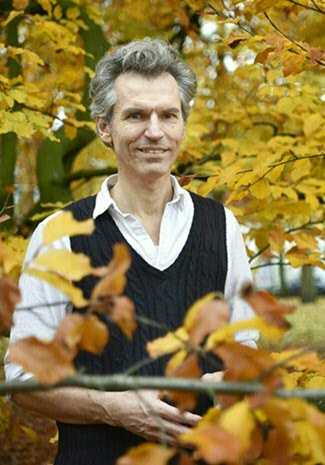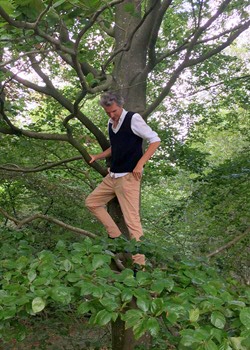Nature, prosperity and happiness
Frans Sijtsma is a nature-lover, a fan of the Wadden Sea who climbs trees as a hobby. But he is also an economic geographer who never loses sight of the hard rules of economics. He tries to unite both of these aspects in his work.

Text: Gert Gritter, Communication UG / Photo: Elmer Spaargaren
Sijtsma (1964) visibly enjoys the view over the Groningen countryside from the Mercator building, which is where his office is located. He loves the wide horizon, the grey sky and the bare trees. When travelling to work from his home in Feanwâlden, he takes the train to Groningen Station and whenever possible, bikes the last part of the journey to the Zernike Campus. He is an outdoor person, with a slim posture and shock of unruly hair that give him the appearance of a biologist conducting field research. However, he is actually an Associate Professor of Economic Geography in the Faculty of Spatial Sciences.
Billiard tables
The degradation of nature reserves and farmland caused by economic developments is an issue that is very dear to his heart. Sijtsma: ‘There’s nothing remotely attractive about farmland any more. The meadows resemble a patchwork of billiard tables and all the wind turbines make rural areas look more like industrial estates. You’re not allowed to erect them in your own garden, but it’s okay in the countryside “because that doesn’t belong to anyone”. The sound of chirping meadow birds seems to be a thing of the past. We’ve lost the human perspective and people feel alienated; they've lost the connection with their living environment, with nature, the cosmos, their ancestors. People are quite rightly very concerned.’
Realist
At the same time, Sijtsma is an economic realist who realizes full well that we should be grateful for our prosperity and that we want to hold on to the benefits we have created. ‘We’ve never been so prosperous. On my nephew’s birthday, I can travel to Hoofddorp (where he lives) and back on the same day. Most people can grow old in good health and we have a high-quality healthcare service. Collectively, we have an unprecedented amount of leisure time. In principle, we have the capacity to banish poverty throughout the world. All this wealth is obviously a blessing, but at the same time, we need to ask ourselves what is really important. How can we harmonize our higher human needs with the production machine that is providing this current level of prosperity? How can you make this sum work?’

Sustainable Landscapes
These are the questions being addressed by the Sustainable Landscapes research group, which Sijtsma coordinates together with Anne Wolff, his colleague from the Faculty of Arts. The research carried out by this group focuses on the ‘hard’ values of economic interests, as well as the ‘soft’ values of nature quality and human welfare. Researchers from various faculties provide expert input. Sijtsma: ‘Our biologists analyse the flight paths of migratory birds. Economic geographers can determine the value of nature in house prices, while landscape historians unravel the origins and development of man-made landscape. By combining innovative academic research from a range of disciplines, and by working together across these disciplines, we hope to construct an effective knowledge machine.’
‘Governance gap’
The ultimate aim of the Sustainable Landscapes project is to develop academic knowledge for better landscape planning and management. Sijtsma: ‘A “governance gap” has developed between hard and soft values. The hard values are being properly represented, but the soft values are lagging behind. On the one hand, we are rich, but on the other hand, we are poor. It’s a highly complex problem, involving very diverse interests. This makes it essential to seek collaboration with farmers, entrepreneurs, citizens, NGOs and government bodies. We must forge ties with well-informed groups and people from outside the UG. Farmers, for example, who are certainly not out to destroy the natural environment. How can you get them involved in landscape issues? How can you give them a voice in our research? It’s an open quest; we need each other if we are to develop nature-inclusive agriculture.’
Science Shops
Another useful tool in Sijtsma’s toolbox is his vast experience with building bridges between research and direct practical applications. He spent 15 years as the coordinator of the Economics/Economics and Business Science Shop. He is used to making science relevant to society. ‘The main thing I learned was how to reformulate a question, which may at first appear irrelevant, so that it becomes academically interesting. In other words, how to turn practical questions into fundamental research subjects. And vice versa.’
Greenmapper
Sijtsma is also keen to bring people and groups together. He is the instigator of the Greenmapper platform. This is a platform where citizens can indicate which nature reserves they value and why: local, regional, national and international nature reserves. They can also register as a ‘friend’ of these areas, bringing them into contact with local landowners and nature management organizations. They can be given a say and provide support. Sijtsma: ‘Everyone appreciates something different about nature, but people are very good at saying what this is: the wide horizons, the tranquillity, the flora, the fauna, whatever. Greenmapper is all about creating online communities for nature, among people who love the same regional, Dutch or foreign nature reserves (Wadden Sea, Veluwe, the Pyrenees). The ultimate goal of these new connections is to boost social and financial support for nature reserves, and improve their natural quality.’
| Last modified: | 30 April 2020 3.12 p.m. |
More news
-
23 April 2024
From battling against the water to living with the water
Margo van den Brink, associate professor of Water and Planning, says that we should adapt our spatial design to the changing climate. This implies difficult choices have to be made because the space is limited and the needs are great.
-
16 April 2024
Investors consider region a risk
Investment in real estate appears to be an important explanation for the gap between big cities and the region, argues Michiel Daams, associate professor of Economic Geography of the Real Estate Market. He conducted research on investments in the...
-
28 March 2024
Felix Pot wins Van der Knaap Dissertation Prize from Royal Dutch Society of Sciences and Humanities
Felix Pot has won the prestigious Van der Knaap Dissertation Prize from the Royal Dutch Society of Sciences and Humanities. He receives this award for his research on the perceived accessibility in rural areas, on which he defended in his...
